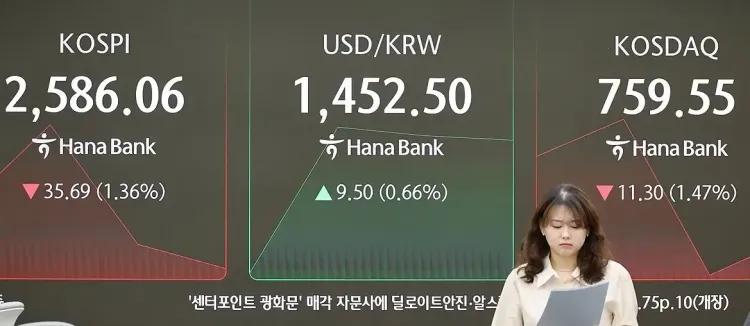Seoul Stocks Plunge Amid Rising US Tariff Concerns

Synopsis
Key Takeaways
- Seoul stocks fell sharply due to U.S. tariff fears.
- Nvidia's earnings did not boost market sentiment.
- KOSPI index declined by 2.76%.
- SK hynix and Hanmi Semiconductor faced notable losses.
- Bank loan rates fell in January as part of a monetary easing cycle.
Seoul, Feb 28 (NationPress) South Korean equities experienced a significant decline on Friday as investor confidence weakened due to impending tariff implementations by the United States and a downturn in Nvidia, a leader in artificial intelligence (AI) chips.
The benchmark Korea Composite Stock Price Index (KOSPI) dropped by 72.29 points, or 2.76 percent, reaching 2,549.46 by 11:20 a.m.
In the previous trading session, Wall Street fell sharply after Nvidia's unexpectedly high quarterly earnings did not revive the AI sector, coupled with U.S. President Donald Trump's announcement of tariff plans impacting China, Mexico, and Canada, according to reports from Yonhap news agency.
In Seoul, most stocks faced losses.
Chip manufacturer SK hynix, a primary supplier to Nvidia, fell by 4.62 percent, while Hanmi Semiconductor, a producer of chip equipment, plummeted by 7.6 percent.
Leading online portal Naver decreased by 4.57 percent, and food conglomerate CJ Cheiljedang dropped by 3.44 percent.
Prominent defense company Hanwha Aerospace declined by 6.47 percent, and gaming firm NCSOFT retreated by 3.1 percent.
The local currency was trading at 1,459.95 won against the U.S. dollar at 11:20 a.m., marking a decrease of 17.35 won from the previous session.
Data released earlier showed that bank loan rates fell in January as the central bank continued its monetary easing approach.
The average interest rate on new loans from banks last month was 4.53 percent, a decline of 0.11 percentage points from the previous month, according to the Bank of Korea (BOK).
Specifically, corporate loan rates fell by 0.12 percentage points to 4.5 percent in January, while rates on household loans also decreased by 0.07 percentage points to an average of 4.65 percent.
Deposit rates offered by banks decreased by 0.14 percentage points to 3.07 percent.
Consequently, the spread between lending and deposit rates widened to 1.46 percentage points last month from 1.43 percentage points in December.
In December, the BOK maintained its benchmark interest rate to ensure financial stability and assess the effects of consecutive rate cuts in October and November.
At the latest rate-setting meeting on Tuesday, the central bank reduced its policy rate by a quarter percentage point to 2.75 percent, emphasizing the necessity to bolster economic growth hindered by domestic political instability and the extensive tariffs enforced by President Trump's administration.










